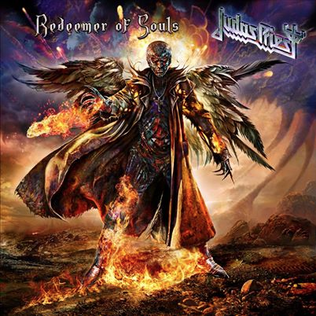Post by Erik Rupp on Aug 10, 2014 12:23:31 GMT -5


Judas Priest's last album, Nostradamus, was an ambitious release. A concept album. A double album.
A failure.
The trepidation with which most Priest fans approached the album wasn't based solely on the subject matter (an outdated cliche if there ever was one), but also on the final song on Priest's previous album. The album, Angel Of Retribution, was Priest's best since Screaming For Vengeance - except for the last track on the album, "Loch Ness," a cheesy song about the mythical Loch Ness Monster. Not only were the lyrics cheesy (even by Judas Priest standards), but the music was pretty cheesy as well. It was a concept song, leading into their concept album. Nostradamus was every bit as bad and as cheesy as most fans feared.
After that album, fans had to wonder, "Does Judas Priest still have it? Can they still put out a great album, or are they spent as a songwriting force?"
Fortunately, Redeemer Of Souls shows that when focusing on making a straightforward album the Priest can still deliver the goods. Maybe the goods aren't as great as they were from Priest's 1976-1984 peak, but at least said goods aren't moldy cheese!
And don't misunderstand, Redeemer of Souls isn't a great album. As much as Priest fans were hoping for a re-energized return to form with some new blood in the band (Richie Faulkner, replacing original Priest guitarist K.K. Downing), Redeemer Of Souls is merely a good, solid Judas Priest album.
What keeps it from reaching the heights of Stained Class, Hell Bent For Leather (aka Killing Machine), and Screaming For Vengeance?
A little too much cheese, particularly in the vocal melody department (the lyrics have their share of cheese, but the vocal melodies themselves are occasionally pretty amateurish and sound like band aping Judas Priest rather than the real thing). Some of the music is overly predictable and familiar, but it's the vocal melody department that lets the album down most. Rob Halford wrote some great vocal melodies during Priest's heyday, and he almost always found a way to keep even the heavier Priest songs catchy and memorable. On Redeemer Of Souls he is hit or miss in that department. A little more hit than miss, fortunately, but nowhere near as consistently good as his songwriting was in the late 70's through the mid 80's.
Fortunately, the band focuses on the more straightforward melodic side Metal more than it does on the heavier, thrashier, more brutal side (unlike Painkiller or Jugulator). That doesn't make Redeemer Of Souls wimpy, and it's certainly not the second coming of Turbo or anything like that, so from the heavy side of music standpoint it should satisfy most Priest fans. The band hasn't missed a beat with the addition of Faulkner, as he fits right in with Glenn Tipton, Ian Hill, and Scott Travis. It still sounds like Judas Priest.
Opening cut, "Dragonaut," is a non-thrashy uptempo track with some classic Priest riffing and some solid vocal melodies (and excellent vocals) from Halford. One thing is for sure, Judas Priest knows how to open an album. After that the results are good more often than not, with tracks like, "March Of The Damned," "Down In Flames," and, "Cold Blooded," among the standout songs.
Of interest are some songs where Judas Priest stretches out a bit. "Crossfire," is a bit bluesy, while, "Sword Of Damocles," sounds like new millennium Iron Maiden. Both are very good songs that work well on their own as well as in the context of the album as a whole, and it's really nice to hear Priest trying something a little different.
But fans of Painkiller can rest easy as there are a couple more songs here (beyond, "Dragonaut," that fit in with that style - "Metalizer," and, "Battle Cry," both of which are fairly solid musically. Also on display are a few songs that sound like paint by the numbers Judas Priest, most notably the title track. Even the standard issue Judas Priest songs are at least somewhat enjoyable, and there isn't anything flat out bad unlike the previous album.
And then there are the bonus tracks, which are generally very good. "Snakebite," is a solid Hard Rock track with a fairly good sense of groove and, "Tears Of Blood," sounds like a cross between British Steel and Defenders Of The Faith era Priest. "Creatures," has elements of both Defenders and Painkiller eras, while "Bring It On," has echoes of the more straightforward Hard Rock songs on Turbo as well as some of the less Metal songs from Angel Of Retribution. None of the bonus tracks on the deluxe edition are less than good, and, "Snakebite," and, "Bring It On," are both very good.
Musically, Judas Priest has bounced back fairly nicely after the huge misstep that was Nostradamus. Unfortunately, the audio production is below average for a Judas Priest album. The guitar tone is somewhat plastic sounding and a little hollow, and is a little lower in the mix than it should be on a few of the tracks (then again, it sounds like it's just a tad too low in the mix because it isn't as full or as warm as some previous Judas Priest guitar tones). The audio production and mix on Angel Of Retribution was far better than on this album, which is disappointing given the fact that Angel is nearly a decade old. Still, the album is listenable from an audiophile standpoint, and the songs are significantly better than on the last Priest album, so Redeemer Of Souls has to be seen as a win overall.
3.75/5
(4/5 if you're a die hard Priest fan.)

